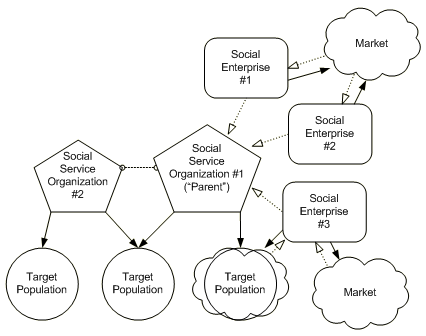 Many nonprofit organizations run multi-unit (mixed) operations, each with different social programs, financial objectives, market opportunities and funding structures. Each unit within the mixed model may be related vis-à-vis target population, social sector, mission, markets, or core competencies. A museum for example, in addition to educational art exhibits, might have both a for-profit catalogue business and highly subsidized research and acquisition operation.1
Many nonprofit organizations run multi-unit (mixed) operations, each with different social programs, financial objectives, market opportunities and funding structures. Each unit within the mixed model may be related vis-à-vis target population, social sector, mission, markets, or core competencies. A museum for example, in addition to educational art exhibits, might have both a for-profit catalogue business and highly subsidized research and acquisition operation.1
Nonprofits employing a mixed model combine social and business entities; subsidiaries owned by the parent organization or departments (cost or profit centers) within it to diversify their social services and capitalize on new business and social market opportunities. Like all social enterprises, mixed models come in a variety of forms depending on the organization's age, sector, social and financial objectives and opportunities. The diagram is representative of complexity, not conformity of organizational form.
Mixed models are often a product of an organization’s maturity and social enterprise experience. This model is common among large multi-sector organizations that establish separate departments or subsidiaries for each technical area--i.e. education, health, economic development, etc. and new business ventures. In nonprofits with mature social enterprises, mixed models are the convention, not the exception, a result of expansion and diversification.
Council of Community Clinics, an example of Mixed Model
Council of Community Clinics (CCC) is a San Diego-based nonprofit membership organization comprised of community clinics serving the uninsured and underinsured poor through three linked but separate entities.
The first entity is a nonprofit advocacy organization, Council of Community Clinics (CCC) that lobbies to change legislation to strengthen the health safety net for at-risk populations. The second entity, Community Clinic Health Network (CCHN), is a nonprofit subsidiary of CCC that provides technical assistance services to build capacity of community clinics in several areas of healthcare and management. The third structure is a for-profit, Council Connections is a wholly owned subsidiary of CCC.
Council Connections is a group purchasing business that buys bulk pharmaceuticals, office supplies, medical surgical supplies, and laboratory services at a discounted volume-based prices, then sells them to community clinics at a mark-up, but at substantially cheaper prices than retail.
- 1Dees, Gregory, Enterprising Nonprofits, Harvard Business Review, January-February 1998
